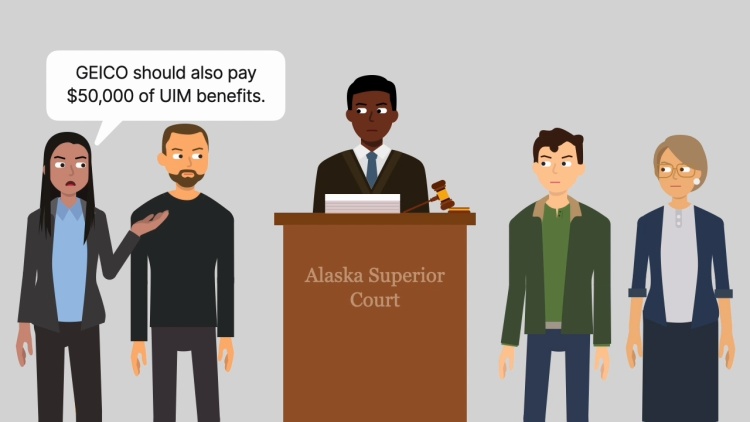Hahn v. Geico Choice Insurance Company
Alaska Supreme Court
420 P.3d 1160 (2018)

- Written by Mary Phelan D'Isa, JD
Facts
Chad Hahn (plaintiff) was injured when he was sitting on his motorcycle at a stoplight and Franklin Townsend’s car failed to stop in time and struck Hahn’s motorcycle from the rear, throwing Hahn backward and causing him to land Townsend’s car after the impact. Because Townsend’s liability-insurance policy, issued by Geico Insurance Company (Geico) (defendant), did not cover the full extent of Hahn’s damages, rendering Townsend underinsured, Hahn sought additional coverage as an insured under Townsend’s underinsured motorist coverage (UIM). That provision extended coverage to any other person occupying the insured auto. Hahn argued that because Townsend’s UIM coverage defined occupying to mean “in, upon, getting into or getting out of,” it followed that Hahn was occupying the vehicle by virtue of his landing on it during the accident. Geico sued for declaratory judgment that no UIM coverage was available to Hahn. The trial court examined cases that interpreted similar policy language and construed the word “upon” in context and, relying on the doctrine of noscitur a sociis (the meaning of an unclear word can be gleaned from the context in which it is used), granted summary judgment for Geico. Hahn appealed, arguing that the trial court erred in its interpretation of the policy.
Rule of Law
Issue
Holding and Reasoning (Stowers, C.J.)
What to do next…
Here's why 905,000 law students have relied on our case briefs:
- Written by law professors and practitioners, not other law students. 47,100 briefs, keyed to 995 casebooks. Top-notch customer support.
- The right amount of information, includes the facts, issues, rule of law, holding and reasoning, and any concurrences and dissents.
- Access in your classes, works on your mobile and tablet. Massive library of related video lessons and high quality multiple-choice questions.
- Easy to use, uniform format for every case brief. Written in plain English, not in legalese. Our briefs summarize and simplify; they don’t just repeat the court’s language.





